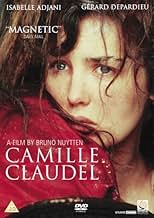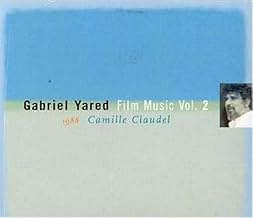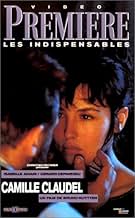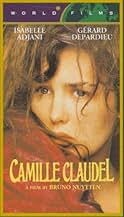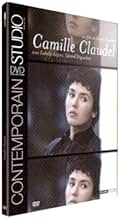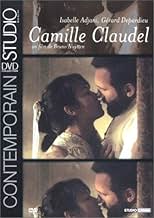Camille Claudel
- 1988
- Tous publics
- 2h 55m
Camille Claude impresses already-famous sculptor Auguste Rodin. He hires her as an assistant, but soon Camille begins to sculpt for herself and she also becomes his mistress. But after a whi... Read allCamille Claude impresses already-famous sculptor Auguste Rodin. He hires her as an assistant, but soon Camille begins to sculpt for herself and she also becomes his mistress. But after a while, she would like to get out of his shadow.Camille Claude impresses already-famous sculptor Auguste Rodin. He hires her as an assistant, but soon Camille begins to sculpt for herself and she also becomes his mistress. But after a while, she would like to get out of his shadow.
- Nominated for 2 Oscars
- 7 wins & 14 nominations total
Featured reviews
The film as a whole is engaging with a whirlwind of emotions--rage, sadness, torment, bliss; by the time the nearly 3 hours are up, I am exhausted. Adjani and Depardieu are part of that emotional energy as they passionately go at it--sex, sculpture and anger; especially when it comes to the latter. It is almost worth it to stop reading the subtitles and listen to them rage and lash out at one another.
Adjani is powerful in so much of this film...I am amazed she didn't receive that best actress Oscar she was up for. Her torment and pain is riveting--especially in French. I am glad they did not decide to dub this film into English; hearing Adjani sob and ask "Pourquoi? Pourquoi?" would be empty with her mouthing the words "Why? why?" in English.
The film as a whole is a bit long, but overall is stunning. The sad epilogue is even sadder if you know that Claudel's remains were interred in a mass grave after her brother Paul failed to claim them from her original grave [the asylums only interred bodies in individual plots for a certain amount of time; space was at a premium.] So, the brilliant Camille Claudel's remains ended up in an unmarked grave mixed in with others who went unclaimed, as well.
From what I have read of various biographies of Camille Claudel, I understand that she was a woman ahead of her time; she scorned the bourgeois, just as many artists, writer, and musicians did -- in the same way that modern artists scorn the common, small-minded, and narrow society (read Hermann Hesse's Steppenwolf for a good understanding of the artist's situation in society).
Following the pattern of Vincent van Gogh and Franz Schubert, Camille Claudel was not a great "promoter" of her works, and, to make things worse, the bourgeois society, just like today, failed to understand her art (again, like the plight of Vincent van Gogh and many others).
At her core, Camille Claudel was a true rebel, not because she wanted to be, but because she had to. Camille Claudel was a true artist, in the very deepest sense.
Camille Claudel, portrayed by the brilliant Isabelle Adjani, was a remarkable sculptor. The film showcases her life journey, from her upbringing in the small village of Villeneuve-sur-Fère to her artistic blossoming in Paris under the guidance of none other than the renowned Auguste Rodin. Their encounter, a passionate rendezvous between student and master, ignites a profound and turbulent love affair.
The film captures the beauty of Camille's artistry as her hands meticulously shape exquisite works of art. Her sculptures are a testament to her modernity, audacity, and unwavering dedication to the craft. They reflect the struggles, the passions, and the relentless pursuit of her artistry, providing glimpses into her inner world. While Camille's works are captivating, her relationship with Rodin brings both admiration and scorn. Their union is a blend of student-mentor dynamics, artistic collaboration, and intense romantic involvement, leading to unrelenting societal judgment.
Yet, Camille is not solely defined by her artistic genius. Her life is marked by isolation, frustration, and the anguish of an unrequited love, intensified by Rodin's continued relationship with Rose Beuret. She becomes an artist alone, adrift in the sea of her emotions. Her world is a whirlpool of despair, loneliness, and financial struggle, interspersed with visions and obsessions that haunt her.
Camille's family disapproves of her lifestyle and choices, and the art world misunderstands her uniqueness. Her mother despises her perceived recklessness, her brother Paul harbors jealousy for her extraordinary talent, and her sister Louise schemes to claim Camille's inheritance. In the face of relentless adversity, Camille is committed to her artistic expression and personal journey.
Despite her distance from Rodin, he continues to support her with discreet acts of kindness. He writes letters to secure precious materials for her work, and he introduces her to influential art critics. However, these critics view her art as unconventional, mirroring her uniqueness and inner turmoil.
Camille Claudel, the artist par excellence, lived a life of wealth, beauty, determination, and promise in her youth. Still, her brilliance was overshadowed by the tragedy of her later years. She was left unrecognized, locked away in isolation, where her art became both her refuge and her torment. It was here, within the confines of her solitude, that she chose to destroy many of her own creations.
Camille's story is a testament to a life of artistry and heartache, unacknowledged talent, and the agony of unrealized dreams. Her impact on the art world was long overdue for recognition. Almost a century later, in 1988, her life's narrative was finally shared with the world through Bruno Nuytten's film, marking a turning point in the rediscovery of her art and her enduring legacy. The Musée Camille Claudel, opened in 2017 in Nogent-sur-Seine, France, stands as a national museum, dedicated to preserving and celebrating her art, ensuring that Camille Claudel's work rightfully finds its place in the annals of art history.
Did you know
- TriviaAlain Cuny, who plays Camille and Paul Claudel's father, actually met Paul Claudel. In 1944, Claudel, a poet and dramatist, personally chose Cuny to play Pierre de Craon in his play: The Tidings Brought to Mary.
- Quotes
Camille Claudel: [to Auguste Rodin] You stole it all! My youth, my work! Everything!
- Alternate versionsThe North American theatrical release was cut to 158 minutes. The Region 1 VHS and DVD releases used this cut print. The full-length 175-minute version is available on Region 2 DVDs released in Europe. The version on Blu-Ray and Amazon Prime Video is 173 minutes, just 2 minutes short of the original European release.
- How long is Camille Claudel?Powered by Alexa
Details
- Release date
- Country of origin
- Official site
- Languages
- Also known as
- Camille Claudel - Violence et passion
- Production companies
- See more company credits at IMDbPro
Box office
- Gross US & Canada
- $3,331,297
- Opening weekend US & Canada
- $89,273
- Dec 25, 1989
- Gross worldwide
- $3,331,892
- Runtime
- 2h 55m(175 min)
- Sound mix
- Aspect ratio
- 2.35 : 1

![Watch Bande-annonce [OV]](https://m.media-amazon.com/images/M/MV5BOTI2NDAyODUtMzAzZi00OTE4LThlYjItZjYwYjk1OThkMDQwXkEyXkFqcGdeQXRyYW5zY29kZS13b3JrZmxvdw@@._V1_QL75_UX500_CR0)


